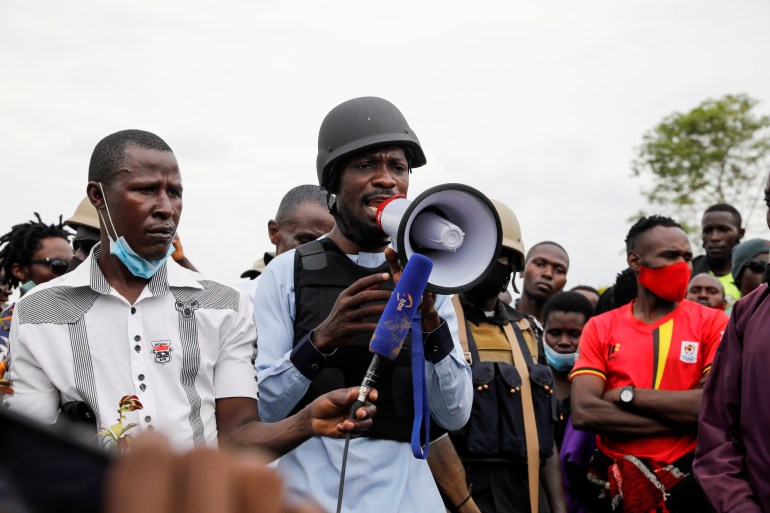Bobi Wine calls Ugandans to ‘rise up’ peacefully against Museveni
Opposition leader claims he is the real winner of the disputed presidential election and lists demands, including the release of political prisoners and end to abductions.

Kampala, Uganda – Ugandan opposition leader Bobi Wine has called for peaceful protests, two months after Yoweri Museveni, who has ruled the country since 1986, was declared the winner of a disputed presidential election.
“I call upon you to rise up peacefully, unarmed and demonstrate against the regime that has oppressed us,” the singer-turned-politician, whose real name is Robert Kyagulanyi, said on Tuesday at the headquarters of his National Unity Platform in the capital, Kampala.
The 39-year-old was speaking beside a table piled high with files, which he claimed contained results forms from individual polling stations. He said based on these results, he was the real winner with 54 percent of the vote. Al Jazeera has not yet been able to verify the evidence he presented.
Museveni has previously described the January 14 poll as the “most cheating-free” election in Ugandan history. According to the country’s election commission, Museveni won re-election with more than 58 percent of the vote, while Bobi Wine came second with almost 35 percent.

The vote was conducted under an internet blackout after campaigns where opposition candidates were routinely obstructed by police, and many people were shot dead by security forces.
Analysts have already identified a number of anomalies in official results, including an improbable turnout of 100 percent at more than 400 polling stations. Last week, while attempting to dispel rumours of rigging, the commission released one results’ form in which the numbers did not add up – suggesting that it had been altered to reduce the tally for Bobi Wine.
In February, the NUP leader lodged a court petition challenging the election results but later withdrew it, complaining that the judges were biased.
“We have brought the case back to the court of the people and the whole of Uganda must now sit and pass judgement,” he told his supporters on Tuesday.
‘Revolutionary election’
Ugandan politics has been building towards this moment for months.
The opposition did not have trust in state institutions to organise a free election or give them a fair hearing in court. After being nominated for president, Bobi Wine promised a “revolutionary election”, warning that if Museveni tried to cheat then he would be toppled like Sudan’s Omar al-Bashir and Libya’s Muammar Gaddafi.
Meanwhile, Museveni has repeatedly claimed that there are “terrorists” and “lawbreakers” within the opposition. In a statement released on Sunday, the 76-year-old accused “foreign meddlers and sectarian parasites” of trying to mount an “insurrection”.
Pre-election tensions boiled over during protests in November, sparked by the arrest of Bobi Wine – one of many in recent years – and his two two-day detention. Young men lit fires in the street and security forces killed at least 54 people.
In the aftermath of the violence, Museveni rejigged his security apparatus, giving prominent roles to his son and to army officers with experience of urban warfare in Somalia, where Ugandan troops are involved in a peacekeeping mission.
The army subsequently arrested hundreds of opposition supporters in an effort to forestall the kind of popular uprising that Bobi Wine is now trying to foment. Many of those arrested were abducted by soldiers in plain clothes and held without charge. Their relatives often do not know where they are being detained.
Ofwono Opondo, a government spokesman, told Al Jazeera the opposition is planning arson and violence, despite Bobi Wine’s avowals of peaceful protest.
“That violence will certainly fail because all those involved are on our crime watch list,” he said.
Four demands
In his speech, Bobi Wine also listed four demands: an independent audit of the election, an end to abductions, the release of political prisoners and an end to the practice of trying civilians in military courts.
In Kisekka, a famous sparkpoint for protest in Kampala, a mechanic who wanted to be identified only as Tony watched the address on his phone.
“You cannot sit back when your brother is in jail,” he said. “You cannot sit back when you don’t have anything to eat.”
But military police stood ominously by the roadside. With many opposition supporters in jail and security forces on alert, large-scale protests will be hard to pull off.
In 2011, after another disputed election, the opposition organised “walk-to-work” protests against high inflation. Security forces shot at least nine bystanders dead and opposition leader Kizza Besigye was airlifted to Kenya’s capital, Nairobi, after being doused with pepper spray.
Following his call for peaceful protests, Bobi Wine gave no clear timetable for action and Kampala remained calm after his announcement.
Angelo Izama, a political analyst, said many of Bobi Wine’s associates won coveted parliamentary seats in the legislative polls also held on January 14, which may distract from the fight for the presidency.
“The problem for Bobi Wine is that often after the election the political momentum shifts to parliament,” Izama said. “If he can demonstrate that [his party] will put their sweep of elected positions aside to focus on the presidential ticket, perhaps the country can focus on it … But I doubt it.”